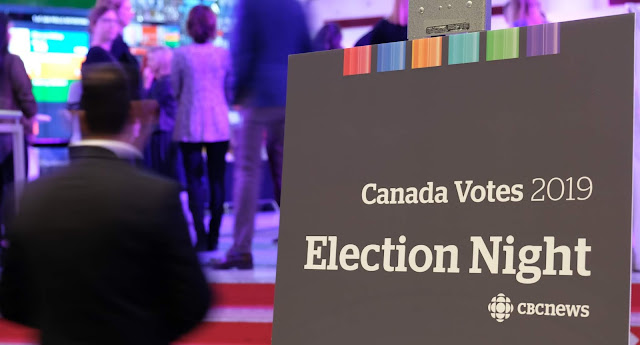Politics
Canada has
voted. Justin Trudeau has been re-elected, leading the Liberal Party in a
minority government. Although he inspired voters across Canada (and around the
world) in 2015, Trudeau lost much of that enthusiasm with a series of mistakes,
from a culturally tone-deaf tour of India, to attempts at influencing a
corruption case against construction firm SNC-Lavalin. And then there were the
blackface photos. But his opponent, Conservative leader Andrew Scheer, refused
to acknowledge climate change. So, for many Canadians in this election, there
was only one choice.
Hopes were high for the engaging New Democratic Party (NDP) leader Jagmeet Singh, particularly after his performance in the TV debates; but those of us who remember Cleggmania from the UK’s 2010 election weren’t surprised that his support didn’t materialise on Election Day. Nevertheless, the NDP could hold the balance of power in Canada’s new Parliament. Harriet’s favourite was Elizabeth May, the veteran Green Party leader, who – even while rallying the country towards more ambitious environmental targets – found time during the TV debates to protest against Brexit, and won an additional constituency (or riding, as they’re known here). At the other end of the spectrum, the People’s Party of Canada, whose policies included ending multiculturalism, failed to win a single seat.
Hopes were high for the engaging New Democratic Party (NDP) leader Jagmeet Singh, particularly after his performance in the TV debates; but those of us who remember Cleggmania from the UK’s 2010 election weren’t surprised that his support didn’t materialise on Election Day. Nevertheless, the NDP could hold the balance of power in Canada’s new Parliament. Harriet’s favourite was Elizabeth May, the veteran Green Party leader, who – even while rallying the country towards more ambitious environmental targets – found time during the TV debates to protest against Brexit, and won an additional constituency (or riding, as they’re known here). At the other end of the spectrum, the People’s Party of Canada, whose policies included ending multiculturalism, failed to win a single seat.
We’ve
mentioned several times before that Canada is a country of many different
cultures, and this is true on the electoral map – so much so that calls for
independence are rising. To the west, Alberta and Saskatchewan, champions of
the oil and gas industry, voted almost without exception for the Conservative
Party. Today Wexit is trending on Twitter. To the east, the Bloc Québécois has
returned with a vengeance; their enthusiasm for a sovereign Quebec will be much
harder to ignore. But along the Atlantic, and here in Toronto, the map turned
almost entirely Liberal red.
On the night
itself, we were invited to the CBC election results party, featuring Andrew
Phung from our favourite Canadian show, Kim’s Convenience. It was an
exciting end to a surprisingly understated campaign. There were nasty moments
(by Canadian standards), but on some days the election was almost entirely
forgotten in favour of the latest drama from London or Washington. This could
be because provincial governments have more influence over the daily lives of
Canadians. Or maybe it’s because the US and the UK are now so dysfunctional,
anything else is mundane by comparison!







Comments
Post a Comment